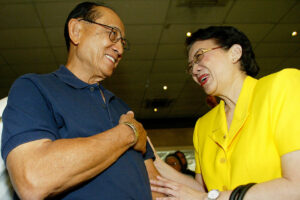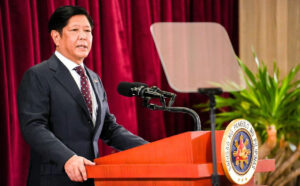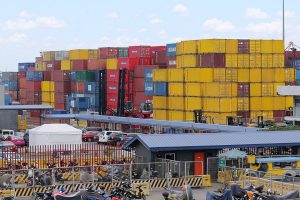FVR was a ‘symbol of stability’, peace broker — Marcos

By Kyle Aristophere T. Atienza, Reporter
PRESIDENT Ferdinand R. Marcos, Jr. on Thursday said the late President Fidel V. Ramos (FVR) was a “symbol of stability” after a popular uprising in 1986 that restored the country’s democracy.
Mr. Marcos made the statement during his visit at the wake of Mr. Ramos, who supported an anti-dictatorship campaign that sent the Marcoses into exile in the United States.
“I just reminded Mrs. Ramos of how FVR, when he became president, was a symbol of stability after all the tumultuous events of 1986,” Mr. Marcos said, based on a transcript sent by his office.
“When he came into the presidency, he brought calm and he brought stability to our country,” he said. “For that, we will always be grateful to him and for all his service all throughout his life — as a soldier and as a public servant.”
Mr. Ramos helped topple the regime of his second cousin, the late dictator Ferdinand E. Marcos, Sr. Mr. Ramos was a military general and headed the police force under Marcos Sr.’s government.
“We clearly have suffered a loss for our country,” the younger Marcos said. “But the memories of him will be good because of all the good work he did for the Philippines.”
Mr. Ramos, who died at the age of 94 on Sunday, will be given a state funeral on August 9, according to Mr. Marcos’ office.
FVR, a United States-trained soldier who became a fighter during the wars in Korea and Vietnam, oversaw the recovery of institutions and sectors ravaged by the Marcos dictatorship.
“He was a minority president who managed to improve the Philippine economy in the 1990s,” Arjan P. Aguirre, who teaches political science at the Ateneo De Manila University, said in a Messenger chat.
But Mr. Ramos’ rule had not been spared from criticisms, most of which stemmed from his pro-market policies involving privatization and liberalization of several economic sectors.
PEACE BASED ON JUSTICEMakabayan, a progressive bloc in the House of Representatives that had been critical of his policies, said he was a leader “who understood that for our country to prosper we need peace based on justice and that it can only be attained by addressing the root causes of armed conflict.”
“Pres. Ferdinand Marcos Jr. would do well to follow his example on the question of peace,” the bloc said in a statement.
Mr. Ramos oversaw the revision of a 1981 anti-subversion law, which human rights advocates said was used during Martial Law years to justify mass arrests, mass detention, and torture of critics. The law outlawed membership to the local communist party and other organizations supposedly associated with it.
The Marcosian law was repealed during Mr. Ramos’ administration in 1992, allowing membership in the local communist party.
“By assuring communist insurgents of political space, we also challenge them to compete under our constitutional system and free market of ideas — which are guaranteed by the rule of law,” Mr. Ramos said in a 1992 speech.
Law experts and several government officials have said mere membership in the communist group does not constitute a crime. It is allowed as long as activism remains in the realm of ideology, they said.
“As an intelligence guy during his military days, he is known for his data-driven and evidence-based analysis of any situation,” Mr. Aguirre of Ateneo said.
“After his stint as president, FVR remained as one of the sought-after figures and seasoned politicians.”
Maria Ela L. Atienza, a political science professor at the University of the Philippines, remembered Mr. Ramos as “a staunch supporter of decentralization and autonomy.”
“He vetoed a bill that sought to ‘recentralize’ health services,” she said in a Viber message. “He and his administration brokered a [peace] deal with the [separatist] Moro Islamic Liberation Front.”




